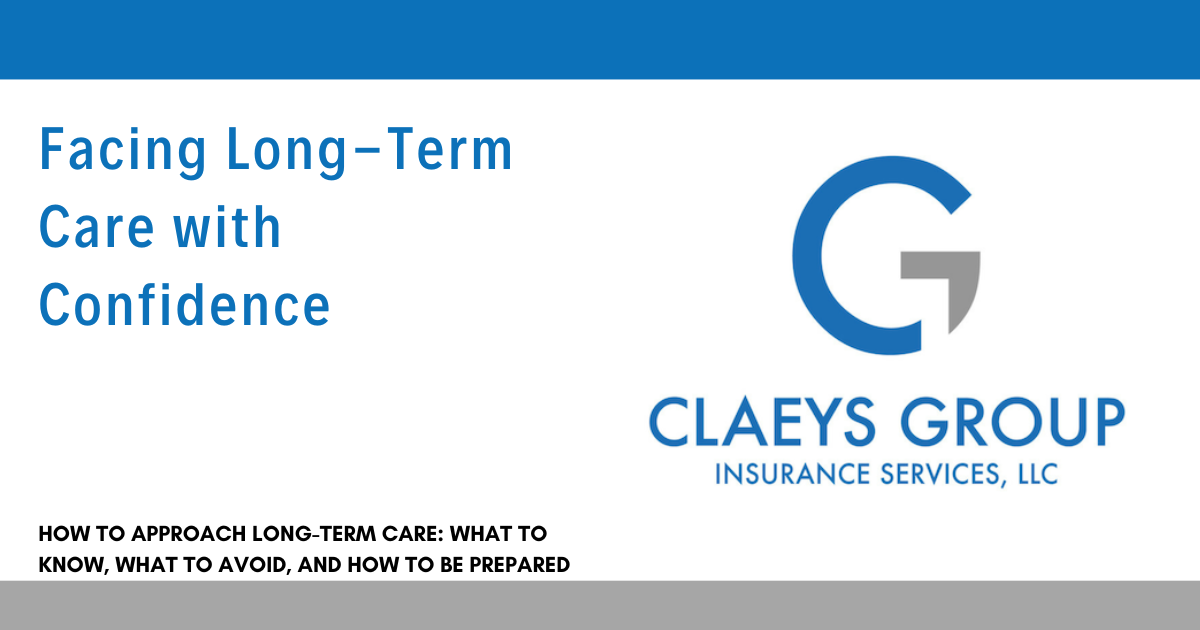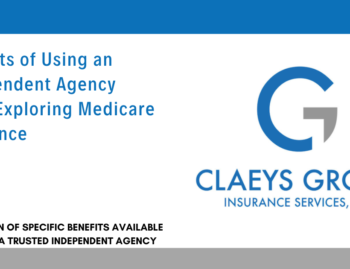
Amy’s Story
Amy sat across the table from me wiping tears from her eyes. She was sharing her haunting encounter with long-term care, which brought sadness to her heart as she recalled it.
Her mother had experienced full-blown Alzheimer’s, which meant she needed continual care. Because Amy was now housing her daughter, who had recently gone through a divorce, and her two granddaughters (her daughter’s children), she had no more room in her home to take in her mother. Besides, both Amy and her daughter worked fulltime which meant they were not available from early morning till evening to care for Amy’s mother. Thus came the need for long-term care for her mom.
Does Medicare Cover Long-Term Care?
Amy’s mom was on Medicare, but Medicare only covers up to 100 days of skilled nursing. Care beyond those 100 days is considered long-term care, which is not covered by Medicare.
So, herein lies the problem. Amy’s mother needed long-term care, but she did not have long-term care coverage; and long-term care can be quite expensive. A stay in a nursing home, for example, can run $5,000 to $8,000 per month, depending on the nursing home and its service area. That’s about $60,000 to nearly $100,000 per year!
Amy’s mother could not afford that. Fortunately, because Amy’s father had understood the importance of life insurance, he provided well for Amy’s mother upon his death. But it wouldn’t take long for her long-term care to eat up the $150,000 she had left.
So what is she to do? Because Amy’s mother did not consider long-term care insurance when there was an opportunity to do so, she has no option but to spend all of her money on long-term care. Though, at one time, she had hopes of leaving her children some money to help with college funding for their kids, that would not be a possibility in her current situation.
The Medicaid Five-Year Look-Back
Amy and her siblings would love to protect their mother’s money; however, there is no way of doing that in her mother’s situation. This is mainly because of the five-year look-back rule.
The five-year look-back refers to a specific aspect of the law relating to long-term care as a ward of the state (the state paying for the individual’s long-term care in a nursing home). In order for one to become a ward of the state (get on Medicaid) for long-term care, the individual would need to spend down all of their money till they only have $2,000 left. Then, and only then, will the state pick up the cost of a nursing home. (There are also other requirements for Medicaid to pay for nursing home stay.)
However, the law also says that, once the need for long-term care arises, you cannot protect any of your money from being spent on long-term care—unless you give it away (such as to your children) more than five years prior to your need of long-term care. Thus, the five-year look-back allows the state to look back over the past five years to make sure that, during that period, you have not tried to hide your money. If you are found guilty of that violation, the state can grab all of that money.
For example, supposing Amy’s mother had given Amy $100,000 within that five-year look-back period of time, and Amy used that money to build a house. If Amy’s mother applies to become a Medicaid patient, the state can force Amy to sell her house in order to recoup that look-back money. On the other hand, if Amy’s mother had transferred, let’s say, $100,000 of her money to her children more than five years prior to being diagnosed with Alzheimer’s, that money would have been protected.
Keeping or Losing Your Freedom to Choose
The saddest part of Amy’s mother’s situation may not even be the loss of the money that was supposed to go to Amy and her siblings. Instead, the saddest aspect may be the loss of freedom of choice regarding her mother’s long-term care.
Nursing homes that get state funding must allocate so many Medicaid beds. Medicaid beds are for those who become wards of the state in regard to long-term care.
However, with the record number of people experiencing long-term care on the state’s money, Medicaid beds fill up quickly. That means that, even though Amy dreamed of being close to her mother for the rest of her life, they may have to settle for a nursing home fifty miles away. In addition, that particular home may not be the kind of home Amy had hoped her mother could stay in. After all, the state does not care if one is happy about their mother’s stay in state-funded long-term care.
Can a Tragic Long-Term Care Outcome Be Prevented?
So, as Amy was sitting opposite me retelling the saga of her mother’s long-term care, tears streamed down her face; for she was overwhelmed. She was thinking about the spending of all of her mom’s money, some of which was supposed to help Amy’s children with college; she thought of her mother living a distance from Amy, making it hard on Amy’s busy schedule to see her mom frequently; and she was burdened by the thought of her mom living in a nursing home that fell far below the standards both Amy and her mother (at one time) had for her stay and her care.
That is a sad and tragic story, one that is replayed—in similar ways—again and again and again. So, what can one do to prevent such a tragedy?
Long-Term Care Insurance: Pros & Cons
Long-term care insurance protects one’s resources. Typically, a long-term care policy provides a certain monetary protection. For example, a policy covering a total benefit amount of, say, $200,000 would provide that amount of coverage for long-term care.
In addition, in partnership states such as Texas, which encourage people to purchase long-term care protection, the total benefit provision of the policy one buys will be the total amount of money protected for that individual, even if one spends through all of that amount for long-term care. This means, with that same $200,000 policy benefit, if the insured spends through that amount on long-term care needs, he could then become a ward of the state; but in his case, he can keep $200,000. Since he had a policy with a $200,000 benefit, Texas (and other partnership states) would allow him to protect $200,000 of his money while still becoming a Medicaid patient. This is how states like Texas reward people for purchasing long-term care.
In addition, purchasing a long-term care policy preserves one’s choices. Without a policy, people have to spend their own money on long-term care—until they only have $2,000 left; but, then, they have to go into a nursing home—of the state’s choice. With a policy, one needing long-term care could choose to remain at home while getting their care. So, one choice would be to remain at home or to go to a facility; and if they choose to receive care in a facility, they have options of facilities, other than the state-appointed nursing home.
A downside of traditional long-term care insurance is that it can be rather pricey and too expensive for some. And the longer one waits to get long-term care insurance, the higher will be the premium. (The premium for someone who purchase long-term care while in their 30s will be much lower than for someone who waits until their 50s or 60s to get the same insurance.)
Furthermore, you won’t be able to lock in your premium for life with a traditional plan. Your premium can keep rising over the years, and you just need to hope it doesn’t become too expensive to where you need to drop the coverage after paying into it for years.
Is There a Better Option for Long-Term Care Insurance?
If, by this question, we mean, is there a lesser-expensive option, the answer is yes. There are a couple of options with a provision for long-term care coverage—life insurance and annuities. With these come a couple of general payment options—single pay and other.
READ ALSO: Life Insurance Buyer’s Guide for 2024
If you have, say, $100,000 sitting in a bank savings account or in a CD (Certificate of Deposit), neither of which is earning anything right now, you might consider putting that $100,000 in either a single pay life insurance policy or in a single-pay annuity. Depending on your age and health, if, for example, you put that money in a permanent life insurance policy, your $100,000 could get you $175,000 or $200,000 face amount which would provide you that amount in a tax-free death benefit you could pass on to your beneficiary (or beneficiaries).
Or, if that same life policy has a chronic illness benefit (which many life policies do have), that $175,000 or $200,000, etc. would provide you with a long-term care benefit. Generally, that benefit would allow you to draw 2% monthly of the face amount of your policy when you meet the qualifications of long-term care on the policy. (Typically, once a medical doctor determines your need of long-term care—based on cognitive impairment or on the inability to perform at least two activities of daily living—then the clock starts ticking over the next 90 days [the elimination period]. Once those 90 days have passed, you can typically you can begin drawing on your chronic illness benefit, which is your long-term care provision.) Thus, if your policy has a death benefit of $200,000, and you qualify for the long-term care (chronic illness) benefit, you can draw $4,000 per month of tax-free money.
If you don’t have $100,000 (or so) sitting around, you can purchase life insurance with a chronic illness benefit with monthly premiums. You can set it up to be paid up in ten years, for example, or you can continue monthly premiums until you encounter the need for long-term care, at which point, your life insurance policy may waive your premium (meaning you won’t have to pay premiums while using it for long-term care). In either case, this policy with a chronic illness benefit will work the same way as a single-pay premium policy will work.
So, what are the upsides of using permanent life insurance (whole life or universal life) or annuities for your long-term care coverage? First, the cost to you will be lower. Second, you won’t have to worry about increasing premiums, as you will with traditional long-term care insurance.
Third, there is a far greater probability you will use a benefit from your life insurance policy or annuity versus traditional long-term insurance. With long-term care insurance, if you never meet the requirements for long-term care, you won’t be able to use the insurance; you will have paid those premiums for all of those years so you could have the peace of mind you had coverage if ever the need were to arise. However, with either permanent life insurance or annuities containing chronic illness benefits, a benefit will be paid in one of three ways: 1) paying for long-term care; 2) providing a death benefit to your beneficiaries; or 3) providing an income stream, if your policy builds cash value. (Look for another article to explain the tax-free income stream that can be acquired through life insurance.)
The Moral of This Story
Thus, the moral of this story is: Be prepared so your story won’t become tragic. Since, nearly 70% of people turning 65 will need long-term care, don’t put off looking into your best options for long-term care.













